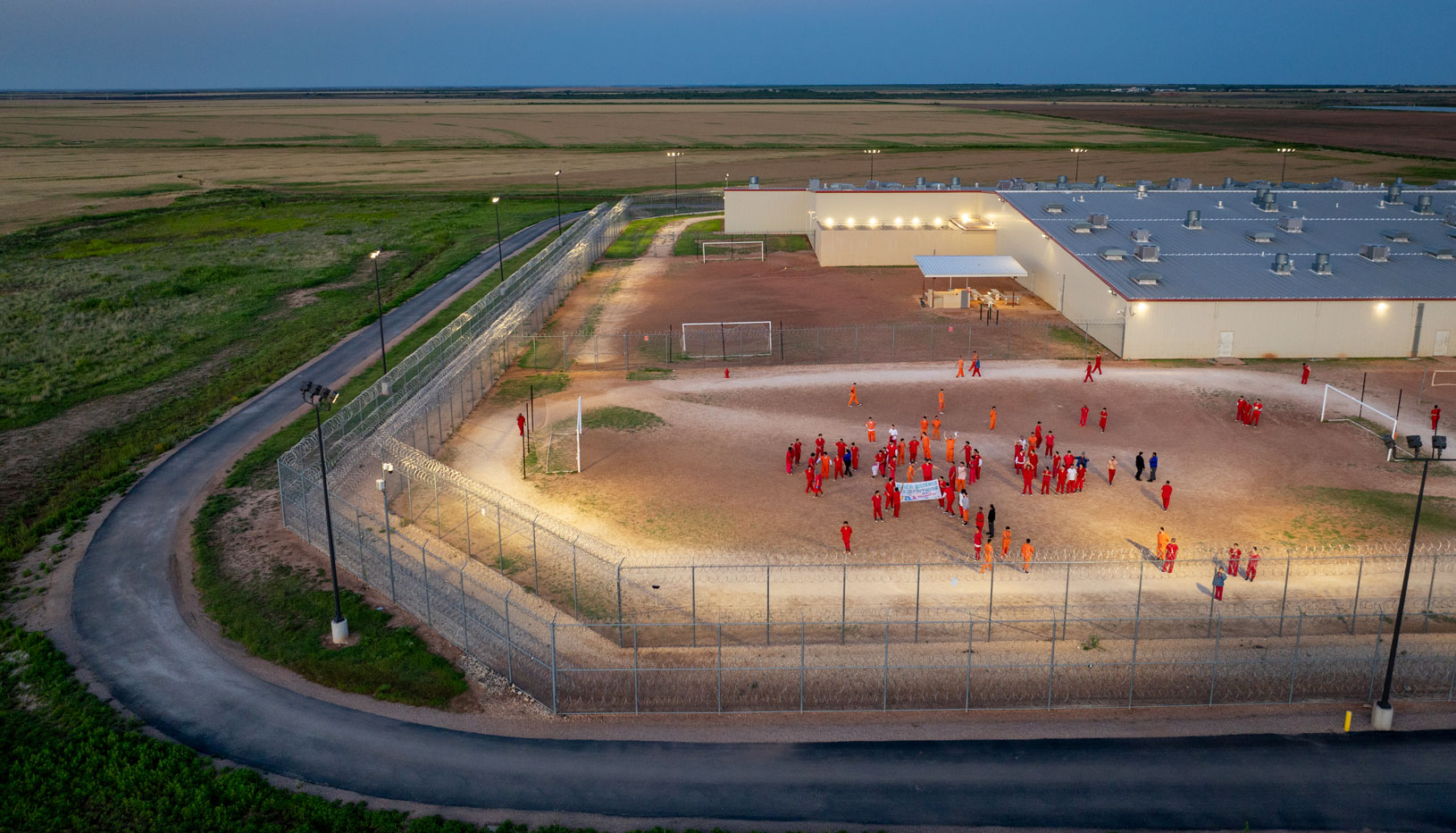President-Elect Joe Biden will take office at a critical moment in the country’s history. There is a tangible opportunity to reconsider and reimagine how, and for whom, the criminal justice system operates. The protests for racial justice that emerged in the summer of 2020 after the killings of George Floyd, Breonna Taylor, and so many others have intensified the demands for system and culture change, opening up political space for reform.
The crisis of overcriminalization and an excessive reliance on punitive enforcement feed the problem of mass incarceration. Although local jails and state prisons account for 91 percent of the nation’s incarcerated population, the federal government can lead the way. The facts are well known: 2.2 million people are behind bars; more than 9 million people cycle in and out of the nation’s colossal network of local jails; more than 4.5 million people are on probation or parole; and more than 70 million people have conviction histories that subject them to lifelong consequences to their lives and livelihoods. In addition, about 40 percent of people in prison are incarcerated with little public safety justification. In fact, over the last decade, 34 states have reduced both imprisonment and crime rates, proving that less incarceration does not necessarily lead to unsafe communities.
The vast racial disparities of America’s justice system compound the unnecessary harms of incarceration. For example, Black people are arrested at a rate more than three times that of white people. They endure interventionist police practices such as pedestrian and traffic stops, excessive enforcement of minor offenses, and targeted policing. One out of every three Black men is incarcerated at some point during his lifetime — with all the devastating impacts that result both from a criminal conviction and from time in custody — compared with 1 in 17 white men. Discrimination on the basis of race and a criminal record can all but disqualify these Black men from housing, education, or employment and in some places can permanently bar them from voting.
What is to be done?
Congress and the president should commit to significant criminal justice reform as a key early priority. Elements of these reforms can be enacted as part of reconciliation or other budgetary measures. Some can be accomplished by executive action, through a renewed Justice Department, or directly by the president through executive orders. Quick action will show the public that the demands for accountability have been heard. Criminal justice reform will show that those in power understand the urgency of stating, with actions as well as words, that Black lives matter.
By championing national use-of-force standards, strengthening police accountability mechanisms, and supporting community-led public safety strategies, we can begin to redefine how communities interact with the police. And although states have traditionally led on sentencing reform, Congress should learn from their successes and support expansive federal drug law reform to significantly reduce the federal prison population. It can also play a greater role, reimagining incarceration itself by significantly limiting the use of solitary confinement, improving access to education, and enacting comprehensive oversight of federal prisons to ensure that incarcerated people are treated with humanity and dignity.
It is time for the federal government to lead on criminal justice reform. This document provides a blueprint for both Congress and the administration to initiate that transformative change. It outlines an affirmative agenda that would help slash America’s high incarceration rate, shrink the wide reach of the justice system, help ensure that people in the system are treated humanely, assist people in rehabilitation and reentry, and reduce racial disparities in the process, all the while keeping the country safe. These solutions are ones for which, in many cases, there is already wide bipartisan consensus. Ending mass incarceration and reforming the American criminal justice system should be a defining legacy of the Biden administration. This report presents one pathway of achieving this goal.
Incentivize States to Reduce Their Prison Populations
- Enact the Reverse Mass Incarceration Act. Federal grants help shape criminal justice policy at the state and local
levels. For decades these grants have subsidized the growth of incarceration. To reverse that flow, Congress can pass
the Reverse Mass Incarceration Act, a bill that has been introduced in two separate congressional sessions. This bill
would dedicate $20 billion over 10 years to states that reduce both crime and incarceration, reshaping state and local
policy.
Advance Policing Reform
- Champion National Use-of-Force Standards
-
Place strict limits on permissible police use of deadly and nondeadly force. Congress should pass
legislation that
would rein in police use of force. For example, holds that restrict airways should be banned, and less-lethal weapons
and techniques of control should be reserved for extraordinary circumstances.
-
Require all law enforcement agencies to adopt a duty-to-intervene policy. Congress should promulgate standards
requiring officers to intervene when their fellow officers misuse force or engage in misconduct — and to report it to
their superiors.
-
Mandate use-of-force reporting to the federal government. The Justice Department should build a comprehensive database
that is accessible to the public by mandating use-of-force reporting by all law enforcement agencies and making federal
support to those agencies conditioned on their compliance.
- Strengthen Police Accountability Mechanisms
-
Amend 18 U.S.C. § 242. Congress should amend 18 U.S.C. § 242 to lower the burden of proof in cases where civil rights may have been violated,
to better equip federal prosecutors to hold law enforcement officers accountable for wrongful acts. The willfulness
standard in § 242 should be explicitly lowered to include knowing and reckless civil rights violations, at the same time
that the law is amended to more clearly enumerate the types of force that will trigger criminal liability — including,
for example, the use of choke holds.
-
Reinvigorate DOJ pattern-or-practice investigations. The Justice Department should resume pattern-or-practice investigations that focus on systemic problematic behavior by a
police department and should support legislation that would provide subpoena power for such investigations.
-
Create a national database of police misconduct records and promote a national standard for decertification. The Justice Department should create a national database of police records and promote national decertification
standards. Currently there is no national standard for police training or certification, nor is there a standard process
by which someone can lose the privilege of holding the public trust required to enforce laws.
- Support Culture Change in Policing
-
Support community-led public safety strategies and systems to identify and remedy racial inequities in policing
practices. The executive branch should support community-led strategies to identify and remedy inequities in law enforcement. The
Department of Justice Bureau of Justice Assistance should provide grants and technical assistance to support the
implementation of new police success metrics — ones that go beyond merely tallying arrests and summonses — in order to
reflect policies and practices that better align with community-led values and public safety priorities. These metrics
may include community engagement, the number of lives kept safe in dangerous police encounters, participation in youth
outreach programs, and the successful diversion of people to community-based services.
-
Promote the creation of co-responder and diversion models. The next president and Congress should incentivize the creation and scaling of diversion strategies that focus on
dealing with the root causes of crime and social disorder, such as mental illness, homelessness, substance use, and
poverty. This would ensure that more Americans are diverted from the justice system entirely.
-
Reinvigorate comprehensive police reform supported by the COPS Office. The Justice Department should resume previous efforts undertaken by the Collaborative Reform Initiative to encourage and
support police reform at the local level — whether to address racial bias, reform use-of-force policies, or improve
police departments’ relationships with their communities.
-
Encourage the demilitarization of the police by eliminating the 1033 Program. To encourage the demilitarization of police, the next administration should eliminate the 1033 Program and prohibit the
transfer of all military-grade weapons to state and local law enforcement agencies.
Encourage Best Practices in Prosecution
-
Support federal, state, and local prosecutors to make transformative change. Prosecutors are among the most powerful officials in the criminal justice system, and they are well positioned to
reverse America’s overreliance on incarceration. The new administration should examine how the Justice Department can
undo regressive policies that have taken hold in recent years and reinstate former Attorney General Eric Holder’s Smart on Crime Initiative, which directed federal prosecutors to
prioritize serious and violent crime over lower-level drug cases. It should also seek to elevate and replicate the
efforts of local, state, and national leaders implementing more justice-oriented prosecutorial practices and appoint a
diverse slate of U.S. attorneys who are committed to reform.
Advance Sentencing Reform to Reduce the Federal Prison Population
-
Support More Expansive Drug Law Reform
-
Repeal mandatory minimum sentences for drug offenses. The new administration should encourage Congress to repeal mandatory minimum sentences for drug offenses, returning
discretion to judges who are best placed to determine an appropriate sentence based on the circumstances of a particular
case.
-
Repeal the 18:1 disparity between crack and powder cocaine. Congress should eliminate sentencing disparities for crack and powder cocaine. These disparities are based on outdated
and incorrect understandings of the connection between drug use and other offenses and have had racially disparate
impacts that undermine community trust in police.
-
No longer use quantity as the primary yardstick in drug sentencing. Congress should eliminate the weight-driven sentencing scheme for drug offenses and focus instead on the circumstances
of the crime and culpability of the accused person.
-
Expand alternative sentences, including the existing statutory safety valve. If Congress maintains mandatory minimum sentencing schemes, it should be encouraged to expand judicial and prosecutorial
options to avoid those schemes where appropriate.
-
Reduce the number of people currently held in federal prison by making changes retroactive. Recent reforms that reduce the length of custodial sentences — whether congressional or executive — should be
retroactive, to directly and immediately impact the incarcerated population. Those sentenced under old laws should also
reap the benefit of a more equitable and reasonable sentencing scheme.
Improve First Step Act Implementation
-
Issue clear guidance for federal prosecutors to encourage full implementation of resentencing provisions. Prosecutors should not needlessly obstruct applications for sentence reductions under the First Step Act. Any opposition
from federal prosecutors should be based on a case-by-case evaluation of the person applying for reductions.
-
Expand and fund rehabilitative programming. The First Step Act requires evidence-based recidivism reduction programs, but the Federal Bureau of Prisons has failed
to ensure that enough programming is available in federal prisons. The next administration must fully fund these
programs so that everyone who wants to participate in vocational training, education, and other programs can do so.
-
Fully utilize or expand compassionate release to better respond to the coronavirus pandemic. The next administration must fully utilize First Step Act compassionate release mechanisms, including by proactively
identifying and releasing those who are particularly vulnerable to Covid-19, acknowledging that Covid-19 outbreaks and
medical vulnerability are sufficient bases on which to request compassionate release, directing federal prosecutors to
stop obstructing meritorious claims, and ensuring release opportunities are provided in a racially equitable manner.
-
Make the amendments that limit § 924(c) stacking retroactive. The First Step Act amended § 924(c) so that the 25-year additional penalty, applicable to those convicted of crimes of
violence or drug trafficking who also used, carried, or possessed a firearm, applied only to those who had a prior,
final § 924(c) conviction. Congress should pass legislation making this change retroactive. Alternatively, the next
president should categorically commute the sentences of those sentenced before the provision was amended.
Improve Prison Conditions
-
Significantly limit the use of solitary confinement. Limiting the time and improving the conditions of solitary confinement can reduce harm to individuals and the
communities to which they eventually return. Additionally, Congress should incentivize states to minimize harms by tying
grant funding to the conditions and extent of solitary confinement.
-
Lift the ban on Pell Grants for incarcerated people. Ninety-five percent of incarcerated people will return to their communities. With access to educational opportunities, they will be better prepared to secure and sustain
employment after release. Lifting the ban on Pell Grants will allow individuals to seek the education they need to break
the cycle of incarceration and poverty.
-
Improve oversight of Bureau of Prisons facilities. Congress should create an independent oversight body with the broad capacity to monitor and inspect Board of Prisons
facilities. This oversight body should have unfettered and confidential access to incarcerated people, staff, and
documents and should not be required to give notice before inspection. Findings should be publicly reported.
Restructure and Streamline Executive Clemency Power
-
Establish a permanent and independent clemency review board. The next president should establish an independent clemency review board to identify both individual cases and
categories of people who qualify for clemency. An independent review process will help avoid giving the impression that
clemency is meted out as a personal or political favor.
-
Establish clear standards and explain clemency decisions. Clemency decisions should be guided by clear standards and be publicly transparent. To avoid the perception of
arbitrariness, the review board should provide robust written reasoning and explanations for its recommendations and
publish an annual report of decisions and other activities.
Help Formerly Incarcerated People Rejoin the Workforce and Community with Clean-Slate Legislation
-
Expand the reach of federal expungement law. “Clean slate” legislation removes barriers for formerly incarcerated people who want to rejoin the workforce and be
contributing members of their communities. Currently the federal system has few ways to protect criminal records, which
are then used to deny individuals’ access to employment, education, and housing. Expanding expungement options for
people with low-level or victimless crimes will give them more opportunities to thrive in their communities and stay out
of prison.
Eliminate the Death Penalty
-
Declare a moratorium on federal executions and enact the Federal Death Penalty Abolition Act. There is substantial evidence that the death penalty is applied inequitably in the United States and that people
sentenced to death suffer in ways that may well violate the constitutional prohibition on cruel and unusual punishment.
The next president should immediately declare a moratorium on federal executions and should encourage Congress to enact
legislation abolishing the federal and military death penalties and commuting existing death sentences.












